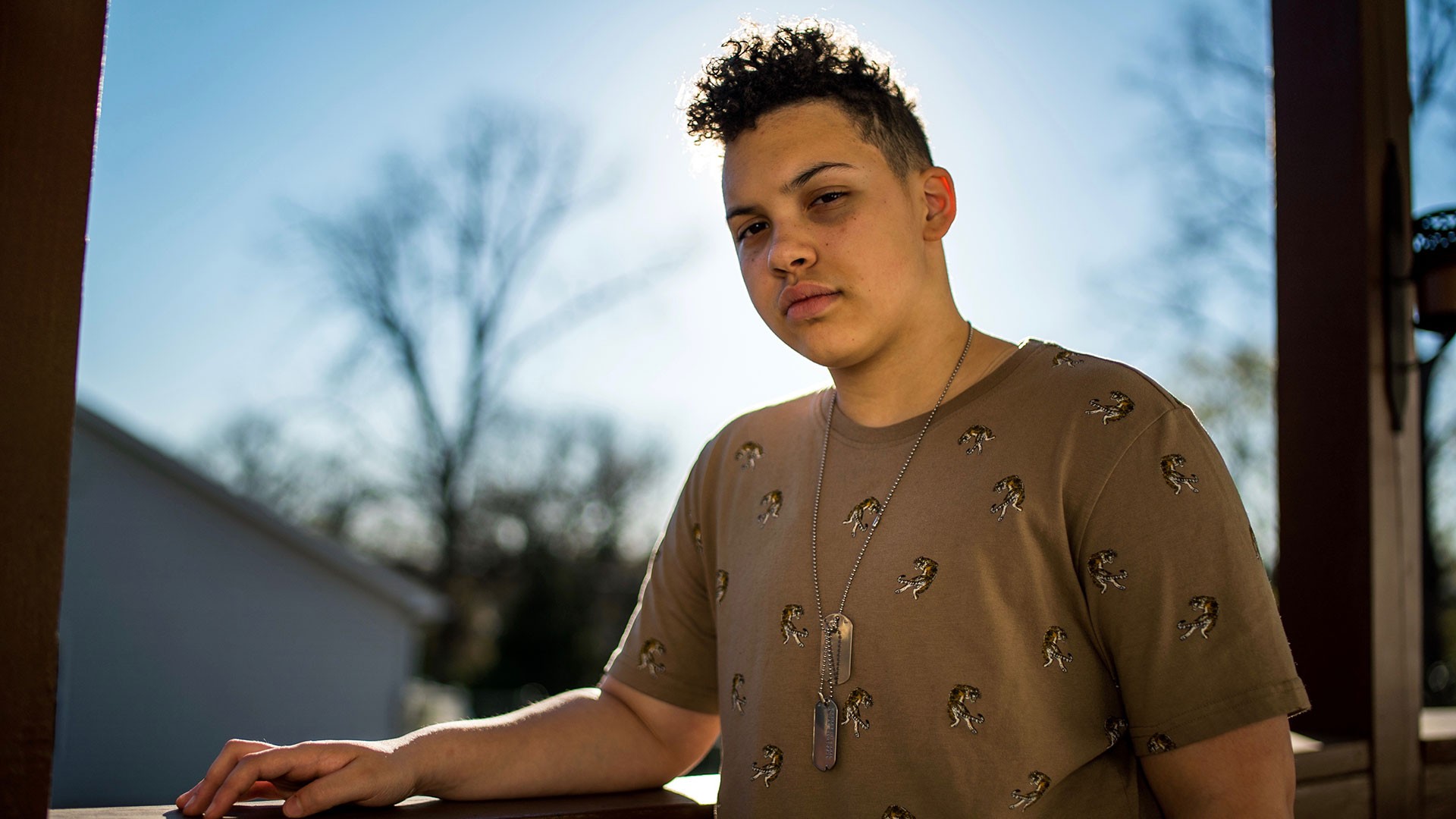Photo by Bonninstudio via Stocksy
According to the National Center for Transgender Equality (NCTE)'s report from the 2015 U.S. Transgender Survey, only 11 percent of trans people have their preferred name and gender marker on all identity documents and official records. "Every time you pull out your ID you're in physical danger," says Jasper Wirtshafter of the Trans Assistance Project (TAP). "If you get pulled over by a transphobic cop, or you're walking into a bar and there's a transphobic bouncer. If you're applying for a job. It outs you." Being outed poses the risk of verbal harassment, discrimination, and even violence. "One third of individuals who [used] documents that didn't match their gender experienced some sort of negative effect from that experience," says Arli Christian, the state policy counsel for NCTE.Christian works with state agencies to streamline the process of changing one's name and gender marker on ID documents such as birth certificates, passports, and driver's licenses. "Changing your name and gender marker is pretty complicated and different based on where you are, where you were born, whether you were convicted of a crime, and immigration status," Christian says. "The process can be quite expensive." Aside from the filing fees for legal name changes, many states still require some sort of doctor's note or gender-affirming surgery in order to get one's gender marker changed. "That's unfair and sometimes completely bars a person," they say. "Not everyone can afford surgery, not everyone needs surgery, not everyone is healthy enough to allow for it."As of 2015, four states—Idaho, Kansas, Ohio, and Tennessee—won't amend the gender marker on a birth certificate under any circumstances. "Birth certificates are often used to get employment, go to school, get other ID documents," says Christian. "They are often the primary proof of citizenship." NCTE is working with state agencies, law enforcement, and departments of vital statistics to create one standardized form for all documents. "There's a huge range of policies out there. DC and Oregon updated their gender markers to remove provider attestation [the doctor's note usually required] and provide a gender-neutral option," they say. "Some states are quite behind. These processes are very burdensome to trans individuals."
Watch: Youth, Interrupted: A Trans Boy Struggles to Survive High School
The Trans Assistance Project was founded to take some of that burden off of trans folks. When Trump was elected, TAP co-founders Tiffany St. Bunny and Ivestei knew the clock was about to go backwards on trans rights. Bunny developed a short questionnaire to match trans people with donors who could provide them monetary assistance to get their documents in order. The form grew into an organization that has given out over $40,000 in assistance to trans people since 2016. To apply, recipients fill out a form on the TAP website requesting money for ID document changes; the organization also distributes support for undocumented and incarcerated trans people. Currently the wait time for assistance is three to four months."We're processing people as fast as we can, but it's really difficult because each state is different, and [within] the state it can differ from county to county," says Ivestoi. "In Oregon, it's the same for the whole state—court-ordered name change is $111. But in somewhere like Florida, it fluctuates between $380 to $411. In Arizona it's $198 to, like, three hundred and something." Broadly contacted the district clerks of five different counties in Texas. The filing fees for a name change ranged from slightly over $200 to just under $300. One county had different fees depending on the reason the name was being changed.
Advertisement
Adding to the confusion, many states require sex be changed "by surgical procedure" but do not actually specify what procedure (or series of procedures) will suffice. "For Florida, it could be as simple as top surgery, shaving down the Adam's apple—different procedures that are gender-affirming," says TAP co-founder Phos Ivestei. But since the average person is not well acquainted with the case law of every state, "they think they need to have bottom or top surgery in order to get that sort of amendment."Surgery is also incredibly expensive, both to pay for the procedure and for living costs during recovery. The Philadelphia Center for Transgender Surgery estimates the cost of female-to-male bottom surgery at $21,250; male-to-female is estimated at $19,750. Neither price estimate takes into account hours of work lost by long periods of recuperation. And this all assumes you live or can travel somewhere where these surgeries are performed. The burden, both financial and logistical, on rural trans people is even higher.Read more: An Airline Refused to Let a Trans Woman Board Her Flight
Advertisement
Watch: Youth, Interrupted: A Trans Boy Struggles to Survive High School

The Trans Assistance Project was founded to take some of that burden off of trans folks. When Trump was elected, TAP co-founders Tiffany St. Bunny and Ivestei knew the clock was about to go backwards on trans rights. Bunny developed a short questionnaire to match trans people with donors who could provide them monetary assistance to get their documents in order. The form grew into an organization that has given out over $40,000 in assistance to trans people since 2016. To apply, recipients fill out a form on the TAP website requesting money for ID document changes; the organization also distributes support for undocumented and incarcerated trans people. Currently the wait time for assistance is three to four months.
Advertisement
"Statutes change all the time, prices change all the time," says Ivestei. "There's still a lot of prices that we don't have and probably will never get unless we physically go to that county." Calling doesn't always work because, most likely due to budget cuts, many counties Ivestei and Wirtshafter have contacted no longer have district clerks on-site. "That office probably doesn't even exist anymore," says Ivestei. "They've probably regrouped with a series of counties, or with the cities with funding." TAP also runs into a sizeable number of transphobic clerks who simply refuse to give the information requested. While going through the counties of Alabama, Wirtshafter "got hung up on a lot.""If I say, 'Hi, I have somebody who wants to get their name changed, how would I go about it?' The first thing I'm asked is, 'Well, why do they want to get their name changed?'" says Ivestei. "And it's like, 'None of your business, and it's kinda your job to just give me your information without taking me apart.'"Trans people face intrusive questions like this at every step of transition. The first gender identity clinic in America, which opened at Johns Hopkins University in 1966, only admitted patients who had no mental illness besides gender dysphoria and who were already living in the gender they wanted affirmed; the clinic also prioritized patients who already possessed stereotypical physical traits. The insurance companies that cover bottom surgery often require two referrals from doctors. That's why TAP made it part of their core ethos that trans people get immediate access to money the say they need. "We built TAP with the idea that gatekeeping could never exist within our [organization]," says Ivestei. "Our organization is all about trusting trans folks, and trusting them to determine their path to care. So we don't have any stipulations for how they use the money. It's distributed for ID changes, but we don't actually monitor or ask for receipts. Once the money is given to them, that's the last they even need to talk to us if they want.""Every time you pull out your ID you're in physical danger."
Christian is heartened by the recent changes made in DC and Oregon, where "now you can go to the DMV and say, 'This is the marker most appropriate to me'" without a doctor's signature. In their opinion, you are the only person who should decide what gender marker goes on your ID. "Often it ends up being the decision of the judge. That's not the appropriate person to make that decision," they say. "Individuals know best their gender."
